-
by sayum
14 February 2026 2:22 PM



In a significant ruling, the Supreme Court of India has declared the marriage between Dolly Rani and Manish Kumar Chanchal null and void due to the non-performance of requisite Hindu marriage ceremonies. The judgment, delivered by Justices B.V. Nagarathna and Augustine George Masih on April 19, 2024, underscores the importance of adhering to traditional Hindu marriage rituals, particularly the saptapadi (seven steps), as mandated by Section 7 of the Hindu Marriage Act, 1955. The court also quashed various legal proceedings related to the marriage and disposed of the transfer petition in light of a joint application under Article 142 of the Constitution.
The case originated from a transfer petition filed by Dolly Rani under Section 25 of the Code of Civil Procedure, 1908, seeking to transfer the divorce petition filed by Manish Kumar Chanchal from Muzaffarpur, Bihar to Ranchi, Jharkhand. Both parties, trained commercial pilots, had claimed to have married on July 7, 2021, obtaining a marriage certificate from Vadik Jankalyan Samiti (Regd.) and subsequently a registration under the Uttar Pradesh Marriage Registration Rules, 2017. However, significant differences and legal disputes soon arose between the couple, leading to the filing of various legal proceedings, including an FIR by Dolly Rani alleging dowry harassment and criminal cases against Manish Kumar and his family.
Validity of Marriage Under Hindu Marriage Act: The Supreme Court emphasized that a Hindu marriage must be solemnized with appropriate ceremonies and in due form. "The word 'solemnized' means to perform the marriage with ceremonies in proper form. Unless and until the marriage is performed with appropriate ceremonies and in due form, it cannot be said to be 'solemnized'," the bench noted. In this case, the couple did not perform the saptapadi, a crucial element for a valid Hindu marriage under Section 7 of the Act.
Marriage Certificate and Registration: The court found that the marriage certificate issued by the Vadik Jankalyan Samiti (Regd.) and the subsequent registration under the Uttar Pradesh Marriage Registration Rules, 2017, were not valid. "The certificate issued by Vadik Jankalyan Samiti (Regd.) in the absence of any indication as to the rites and customs that were performed would not be a certificate evidencing a Hindu marriage in accordance with Section 7 of the Act," the court observed. Consequently, the registration of such a marriage is of no legal consequence.
Legal Reasoning: The judgment extensively discussed the necessity of following the prescribed ceremonies for a valid Hindu marriage. "In the absence of there being any valid Hindu marriage, the Marriage Registration Officer cannot register such a marriage under the provisions of Section 8 of the Act," the court stated. It further highlighted that the registration of a marriage under Section 8 is only to confirm that the parties have undergone a valid marriage ceremony in accordance with Section 7 of the Act.
Justice B.V. Nagarathna remarked, "A Hindu marriage is a sacrament and has a sacred character. The critical conditions for the solemnizing of a Hindu marriage should be assiduously, strictly and religiously followed." This observation underscores the court's emphasis on the sanctity and ritualistic importance of Hindu marriages.
Conclusion: The Supreme Court's decision to declare the marriage null and void reaffirms the legal framework governing Hindu marriages, highlighting the necessity of performing traditional ceremonies. By quashing the associated legal proceedings, the court has also provided clarity on the status of marriages that do not conform to the prescribed rituals. This judgment is expected to have a significant impact on similar cases, ensuring that the sanctity of Hindu marriage ceremonies is upheld in legal contexts.
Date of Decision: April 19, 2024
Dolly Rani vs. Manish Kumar Chanchal
